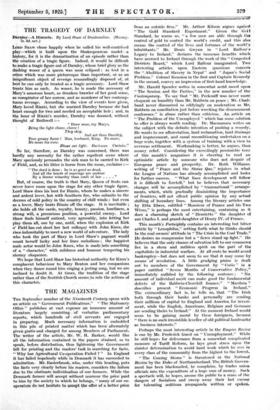THE TRAGEDY OF DARNLEY
Loan Screw chose happily when he called his well-contrived play—which is built upon the Shakespearean model—a history, for it is the dramatization of an episode rather than the creation of a tragic figure. Indeed, it would be difficult to make a tragic figure out of Darnley, whose brief glory as the dashing wooer of a queen was soon eclipsed : as tool in a
crime which was more picturesque than important, or as an insignificant object of revenge resoundingly disposed of, at best he can only be treated as a tragic accessory. Lord Shaw treats him as such. As wooer, he is made the accessory of Mary's amorous heart, as drunken brawler of her good sense, as conspirator of her sorrow, and as murderer of her contemp- tuous revenge. According to the view of events here given, Mary loved Rizzi bift she married Darnley because she had heart enough for two and needed an acceptable heir ; and, in the hour of Rizzio's murder, Darnley was doomed, without thought of Bothwell
" Draw near, my Marys, Bring the light closer, closer !
They obey. And art thou Darnley, Poor greasy flame ! Man, husband, King. No more, No more for ever. Blows out light. Darkness. Curtain."
So far, therefore, as Darnley was concerned, there was hardly any necessity for the rather repellent scene where Mary speciously persuades the sick man to be carried to Kirk o' Field, and, as his litter is borne from the room, exclaims :-
" The deed is done : he is as good as dead, And all the bonds of marriage are undone
By a fiercer wizardry than craft of law . . . . "
But, of course, the truth is that Mary, Queen of Scots can never leave room upon the stage for any other tragic figure.
Lord Shaw does his best for Rizzio, whom he makes a sincere and ardent lover, hot with Southern fire, who submits to the decrees of cold policy in the country of chill winds : but even as a lover, Mary beats Rizzio off the stage. It is inevitable ; she holds all the cards, royalty, beauty, passion, loneliness, a
strong will, a precarious position, a powerful enemy. Lord Shaw fords himself enticed, very agreeably, into letting her play them all, one by one,, until, when the explosion at Kirk
o' Field has cut short her last colloquy with John Knox, she rises indomitably: to meet a new world of adventure. The lady who took the part of Mary in Lord Shaw's pageant would count herself lucky and her lines melodious ; the happiest male actor would be John Knox, who is made into something of a " character," with mildness and humour tempering his stormy eloquence.
We hope that Lord Shaw has historical authority for Knox's complacent behaviour to Mary Beaton and her companions when they dance round him singing a jesting song, but we are inclined to doubt ft. At times, the tradition of the stage rather than of the Scottish Church seems to rule the actions of this character. • -










































 Previous page
Previous page